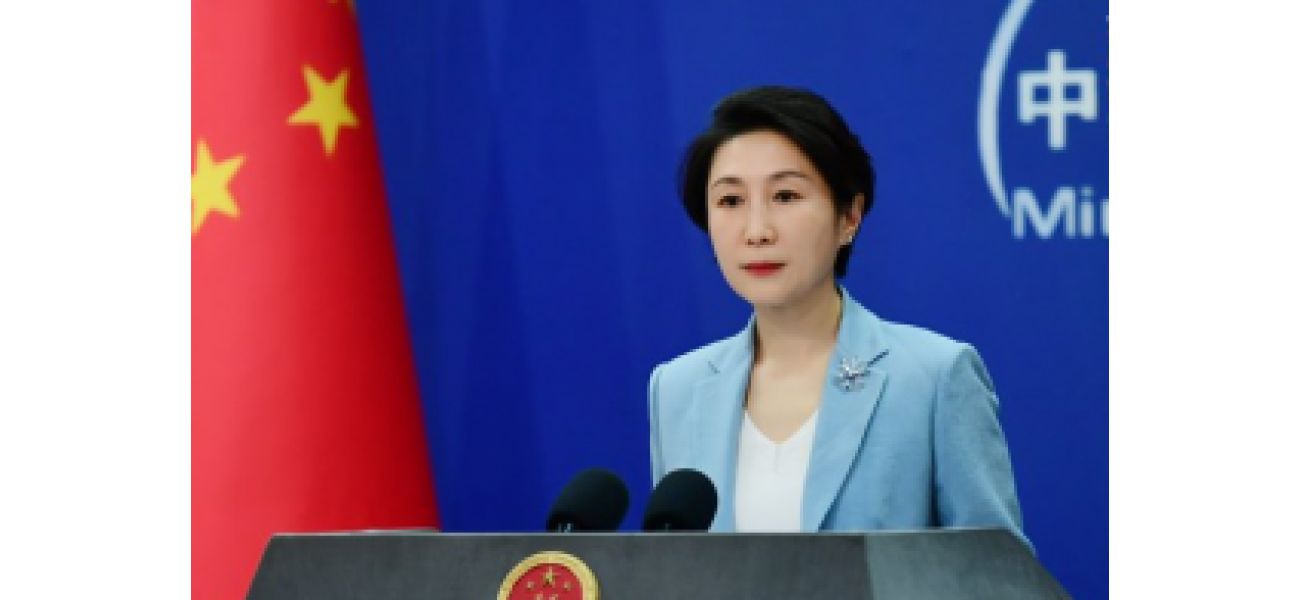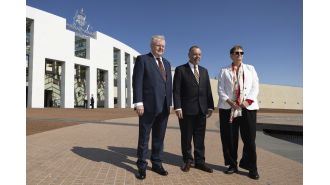China and Japan discuss ways to ease tensions caused by PM Takaichi's comments on Taiwan.
China and Japan hold talks in Beijing to ease tensions sparked by Japanese PM's comments on Taiwan.
November 18th 2025.

Representatives from China and Japan came together in Beijing on Tuesday for discussions aimed at easing tensions between the two countries. The recent remarks made by Japanese Prime Minister Sanae Takaichi regarding Taiwan had caused a sharp decline in their bilateral relations, prompting the need for these talks.
According to Mao Ning, spokesperson for the Chinese Foreign Ministry, the Director General of the Department of Asian Affairs, Liu Jinsong, held consultations with Kanai Masaaki, Director-General of the Japanese Foreign Ministry's Asian and Oceanian Affairs Bureau. China used this opportunity to urge Japan to retract their remarks and refrain from creating further issues related to China.
Mao emphasized the need for Japan to immediately withdraw their wrongful statements, reflect on their actions, and provide a clear explanation to the Chinese people. She also addressed reports of Japan's plans to modify the ranks of their Self-Defense Forces and revert to using Imperial Japanese Army rank titles. Mao firmly stated that China will not allow the resurgence of Japanese militarism, nor will they tolerate any attempts to challenge the post-war international order or disrupt global peace and stability.
In response to Japanese protests over Chinese coast guard ships patrolling disputed waters in the East China Sea, Mao clarified that these patrols are lawful and justified. She dismissed Japan's unreasonable representations and stated that China has already rejected them and lodged their own representations.
The tensions between the two countries began to escalate after Takaichi, who is known for her strong stance against China, made remarks in a parliamentary committee on November 7, suggesting that a Chinese military attack on Taiwan could lead to a survival-threatening situation for Japan. She also mentioned that Japan could exercise its right to collective self-defense in such a scenario.
Apart from lodging diplomatic protests, China, which is the largest source of tourists to Japan, has also advised its citizens to avoid traveling to the country. This has resulted in a significant number of cancellations of Chinese tourist trips. Reports from Japan indicated that these talks were aimed at calming the situation, as it has started to affect various sectors such as tourism, education, and entertainment between the two neighboring countries.
China, which considers Taiwan as part of its mainland, has demanded that Takaichi retract her statements. They maintain that the Taiwan issue is purely an internal matter. During the talks with Liu, Kanai was expected to stress that Takaichi's remarks do not change Japan's position as stated in a 1972 joint communique. This document recognizes the People's Republic of China as the sole legitimate government and switched Japan's diplomatic recognition from Taiwan.
China and Taiwan have been governed separately since their split in 1949 following a civil war. Kanai was also likely to raise the issue of a social media post made by Chinese Consul General Xue Jian in Osaka. In the post, Jian threatened to cut a dirty neck without hesitation, in apparent anger over Takaichi's remarks. In response to this, Chief Cabinet Secretary Minoru Kihara of Japan stated that the country is open to dialogue with China.
These statements came after the Chinese Foreign Ministry announced that Premier Li Qiang has no plans to meet with Takaichi during the upcoming Group of 20 leaders' summit in South Africa. Additionally, Chinese media reported on Monday that two Japanese film releases scheduled for later this week and early December have been postponed in China.
Overall, the talks between China and Japan aimed at easing tensions and restoring their bilateral relations, which have been strained due to recent events. Both sides have expressed their views and concerns, and it is hoped that these discussions will lead to a peaceful resolution.
According to Mao Ning, spokesperson for the Chinese Foreign Ministry, the Director General of the Department of Asian Affairs, Liu Jinsong, held consultations with Kanai Masaaki, Director-General of the Japanese Foreign Ministry's Asian and Oceanian Affairs Bureau. China used this opportunity to urge Japan to retract their remarks and refrain from creating further issues related to China.
Mao emphasized the need for Japan to immediately withdraw their wrongful statements, reflect on their actions, and provide a clear explanation to the Chinese people. She also addressed reports of Japan's plans to modify the ranks of their Self-Defense Forces and revert to using Imperial Japanese Army rank titles. Mao firmly stated that China will not allow the resurgence of Japanese militarism, nor will they tolerate any attempts to challenge the post-war international order or disrupt global peace and stability.
In response to Japanese protests over Chinese coast guard ships patrolling disputed waters in the East China Sea, Mao clarified that these patrols are lawful and justified. She dismissed Japan's unreasonable representations and stated that China has already rejected them and lodged their own representations.
The tensions between the two countries began to escalate after Takaichi, who is known for her strong stance against China, made remarks in a parliamentary committee on November 7, suggesting that a Chinese military attack on Taiwan could lead to a survival-threatening situation for Japan. She also mentioned that Japan could exercise its right to collective self-defense in such a scenario.
Apart from lodging diplomatic protests, China, which is the largest source of tourists to Japan, has also advised its citizens to avoid traveling to the country. This has resulted in a significant number of cancellations of Chinese tourist trips. Reports from Japan indicated that these talks were aimed at calming the situation, as it has started to affect various sectors such as tourism, education, and entertainment between the two neighboring countries.
China, which considers Taiwan as part of its mainland, has demanded that Takaichi retract her statements. They maintain that the Taiwan issue is purely an internal matter. During the talks with Liu, Kanai was expected to stress that Takaichi's remarks do not change Japan's position as stated in a 1972 joint communique. This document recognizes the People's Republic of China as the sole legitimate government and switched Japan's diplomatic recognition from Taiwan.
China and Taiwan have been governed separately since their split in 1949 following a civil war. Kanai was also likely to raise the issue of a social media post made by Chinese Consul General Xue Jian in Osaka. In the post, Jian threatened to cut a dirty neck without hesitation, in apparent anger over Takaichi's remarks. In response to this, Chief Cabinet Secretary Minoru Kihara of Japan stated that the country is open to dialogue with China.
These statements came after the Chinese Foreign Ministry announced that Premier Li Qiang has no plans to meet with Takaichi during the upcoming Group of 20 leaders' summit in South Africa. Additionally, Chinese media reported on Monday that two Japanese film releases scheduled for later this week and early December have been postponed in China.
Overall, the talks between China and Japan aimed at easing tensions and restoring their bilateral relations, which have been strained due to recent events. Both sides have expressed their views and concerns, and it is hoped that these discussions will lead to a peaceful resolution.
[This article has been trending online recently and has been generated with AI. Your feed is customized.]
[Generative AI is experimental.]
0
0
Submit Comment





